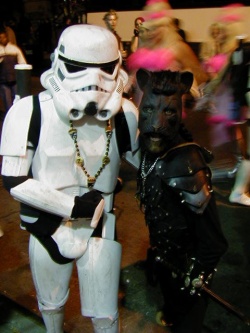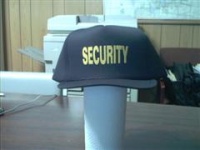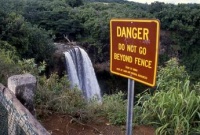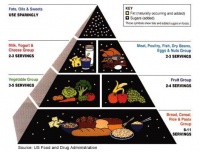User:Cdoane/Convention Security 1
m (Adding "Category" Tag) |
m (added a Category) |
||
| Line 133: | Line 133: | ||
Call for help if needed | Call for help if needed | ||
If you forget all else just remember to think 'what would a responsible person do?'. Good Luck! | If you forget all else just remember to think 'what would a responsible person do?'. Good Luck! | ||
| − | [[Category:Resource|Con Security]] | + | [[Category:Resource|Con Security]][[Category:Academy|Con Security]] |
Revision as of 17:31, 26 October 2008
Basic Convention Security Officer Course
Introduction
We've all seen them; heck some of us have done it. Volunteer Security. Either at a Ren Faire, Star Trek Con, or some other fandom event. Despite the differences in fandom they do share one thing. The need for Volunteer Security. It is the hope of the authors that this set of Convention Security Courses will assist the Volunteer in presenting a professional and knowledgeable demeanor at any event. Volunteers come in many outfits and ID methods, no longer are they limited to the red shirt of TOS or just ID badges (though that second is a common method).

Its especially important to conduct yourself professionally in any situation and when confronted by any type of fan. These may be typical of the fans you will come across. *grin*
==Chapter 1== Orientation to Volunteer Security
A security guard is a private person who is assigned to keep order or to protect property by prevention of loss, usually by maintaining a high visibility presence and observing for signs of crime, fire or disorder; then taking action and/or reporting any incidents as appropriate. The words that are very important to understand are “private person". As a Volunteer Security Officer you do NOT have any powers of arrest, forcible detention, or other police powers. Your abilities in this area are as limited as any other private citizen.
With that in mind you are still there to protect the interests of the event and Patrons in so much as possible. So, other duties may include access control at points of entry by ensuring that visitors display proper passes or identification before entering. Volunteer Security are often called upon to respond to minor emergencies and to assist in serious emergencies by calling and/or guiding emergency responders to the scene of the incident and documenting what happened on an incident report. Remember your no replacement for an EMT, no matter how many times you've seen MASH *grin*. Unless you are a medical proffesional leave the serious items in their care.
It is not required but HIGHLY encouraged for Volunteer Security to be certified in First Aid/CPR, as you are likely to be first on the scene of a medical problem and this will help you to follow proper procedure. Also if the event you are working has medical personnel you should make sure you know how to get a hold of them, in addition to following the contact procedures of event Big Wigs at whatever event you may find yourself. As a rule of thumb, you should know your Security Superior and two levels above.
To summarize ones duties, there are four main taskings:
Tasks:
- Circulate among visitors to preserve order and protect property.
- Warn persons of rule infractions or violations.
- Escort individuals to specified locations and to provide personal protection.
- Stand post at entry points.
Number 1 is generally called a ‘Roving Position’ or ‘Patrol’. In this case you may find yourself roving in a dealer/vendor area for example, keeping an eye on the property and persons in the area. Each patrol area may have special concerns please discuss with your superior in advance.
Number 2 you will need to be alert for problems in those cases be firm but polite when dealing with patrons, no one likes being told they can't do something. Its important to protect the event but due care must be taken of the Patron whenever possible. More in dealing with trouble patrons later.
Number 3, known in some convention circles as ‘VIP Security’. This is generally the choice assignment only the best and most professional Security Volunteers can get. It is these people that escort the Stars or other Special event visitors.
Number 4 also known as death by boredom (kidding, maybe *grin*.) In this case you are in what is known as a ‘Stationary Post’ or generally just ‘At Post’. You pretty much stay in one area checking badges or some such until relieved.
Below are useful skills and work ethics:
Monitoring/Assessing performance of you, other individuals, or organizations to make improvements or take corrective action is an important skill. After all you are the ‘man on the ground’, since Volunteer Security deal with the event Organizers and the Patrons they are in a unique position to make suggestions for improvement of the event.
ALERTNESS! is your best friend with it you can spot a potentional problem before it starts this is also known as ‘Problem Sensitivity ‘. The single most important skill a securit officer can possess.
Work Ethic:
- Attention to Detail - Job requires being careful about detail and thorough in completing work tasks.
- Integrity - Job requires being honest and ethical.
- Cooperation - Job requires being pleasant with others on the job and displaying a good-natured, cooperative attitude.
- Dependability - Job requires being reliable, responsible, and dependable, and fulfilling obligations.
- Stress Tolerance - Job requires accepting criticism and dealing calmly and effectively with high stress situations.
- Concern for Others - Job requires being sensitive to others' needs and feelings and being understanding and helpful on the job.
- Self Control - Job requires maintaining composure, keeping emotions in check, controlling anger, and avoiding aggressive behavior, even in very difficult situations.
- Leadership - Job requires a willingness to lead, take charge, and offer opinions and direction.
==Chapter 2== The Basics
In the Above chapter you learned what generally is required of a Volunteer Security Officer. In this chapter you will be given specific information on event assignments and general tips.
General Security Tips:
- Always deal with people and situations in a dignified manner; keeping cool, collected, and in control.
- Must have the ability to adapt.
- When volunteering, report your handicaps (if any), whether or not staying at event hotel, times available, if you have special equipment you can bring, previous experience, contact info.
- Ask when/where to meet, what you should bring, how to contact Security Chief in case of emergency (prior to con), what perks do you get. etc.
- Contact Security Chief after getting settled in your room but before registering.
- Make sure you know what/where/when your assignment is, and that you understand your duties.
- REMEMBER you have NO Power or Authority to arrest, or detain by force (you can only ask); radio the Command Center and have them call the police, if needed, due to probable cause (sufficient reason based on known facts to believe that a crime has been or will be committed or that certain property is connected with a crime.
- Don't promise anyone something you are not directly responsible for doing (for example: don’t promise an autograph or a freebie, it may not happen).
- Don't give medical advice unless you are qualified (certified or trained) to do so (EXCEPTION: life-threatening situation that you have been trained to deal with, such as CPR).
- Always attempt to resolve problems politely and in a timely manner.
- Know where everything is and when events are, remember you are a visible and sometimes mobile info booth.
The above is generally useful for any type of event, always remember if not sure ask your supervisor. It is important before you enter into any agreement that you fully understand what is expected of you and what you can expect. Some write down their questions in advance of discussing working an event.
Actual event assignments can include, entry points(badge checking), event room or area(watching for problems in a given area), patrols(Rovers watching for problems and given the stationary guards a break as needed), undercover patrol(stealth security with no security or event ID, usually in a vendor area), dealer's room or area(mainly to watch for shoplifting), guest or star escort(bring them water, don‘t let fans rip off their clothes, get them where they need to be, etc), registration help(in processing of patrons), dealer's help(Vendor Slave*grin*), gopher (errand &/or messages, odd jobs), autograph line(making sure there is no pushing, yelling news, etc). Keep in mind new security usually start out at the simplest jobs and work their way up, for example from errand to star escort, by getting a good reputation with other events you can expect more consideration when applying for the ‘choice’ assignments.
Special Situations: Be alert as to the problems that can occur in any given setting. For example outdoor events have the added problem of heat related illness, if done in spring or summer. Before working any event you should try to go over all likely problems and plan for them.
==Chapter 3== Taking care of yourself.
If you go down due to some illness or unable to do your job because of some problem, you’ll help no one. A few tips:
- Drink enough water, if outside in the sun be sure to use sunscreen.
- Eat enough. At regular intervals.
- Make sure your shoes are comfortable, yes combat boots look cool but can you wear them for a multi-hour shift?
- Make sure you are wearing the proper clothes for the weather and for the event. If the event has a dress code be sure to follow it as closely as possible. Many events will provide ID or some other manner of event security identification.
Equipment-
- Water Bottle(seriously, dehydration is one of the bigger problems faced by event staff, especially those outdoors. Can be substitution for anything with electrolytes, caffeine and soda/pop should be drunk in moderation as they can increase rate of dehydration.
- Radio(If possible have your own, some events may not have enough to go around or something may happen to what they have. If you can come to an event ‘ready made’, all the better for your professional appearance. Remember try to be professional on the radio and cut out any chatter not related to the event. Find out what Radio protocols your event is following and stick to it.
- Event Map and Schedule.
- Cell phone. Trust the authors, this is very handy. Especially in out of the way posts.
- Pen and pocket notebook.
Misc:
Lost & Found Know where to send or locate lost items. Lost children should be taken to a designated area and parents/guardians sent to that area.
Shoplifters/Hostile Persons/, etc NEVER physically touch person; call your Supervisor, if you can't get them go for the next higher and "Be the best witness you can be" (note all pertinent info - height/ weight/ build/ coloring/ clothing/ etc)
Minor Disagreements:
Try to politely defuse the situation &/or tell person/s that you will get someone who can better assist them
Remember: Stay calm & polite Call for help if needed If you forget all else just remember to think 'what would a responsible person do?'. Good Luck!


